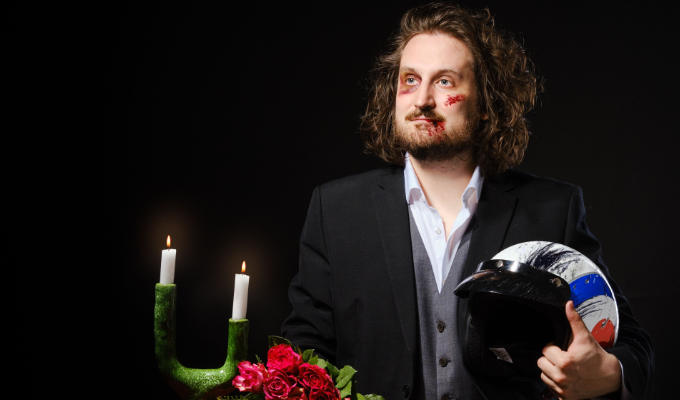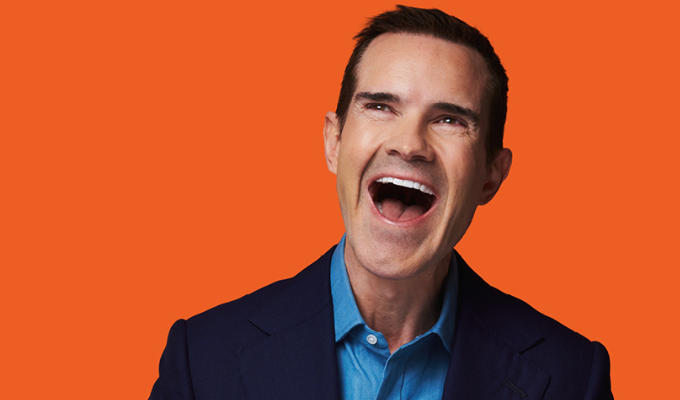Ealing Comedy Festival gig 2010
Note: This review is from 2010
Review by Steve Bennett
With the plethora of outdoor festivals and comedy tents, it’s easy to overlook the Ealing Comedy Festival. But this well-established week-long event has been steadily building over the years, and 2010’s massive big top is offering impressive bills, each full of comics who would headline anywhere else, to the good folk of West London.
It has something of a reputation for being a ‘posh’ do – and there were certainly more sweaters draped over shoulders than you might find at your typical comedy club. But it allowed compere Micky Hutton to play up the jovial Geordie monkey-boy shtick, as if he was an impish jester brought in to regale the gentry with fantastical tales of strange Northern ways.
It’s an affable, if not particularly interesting, fresco he paints of sturdy ‘fat lasses’, Gregg’s pasties and dirty-cheap houses, that raises gentle chuckles. And in his opening bit, at least, he seems to leave before he started, having barely warmed the audience beyond room temperature.
Not that it affected Jo Caulfield’s set in any way, as her indiscreet bitching about friends and family means everyone immediately feels as if they have been taken into her confidence. Plus, there is much to identify with as she gossips about lightweight friends, children she has to pretend to like, feckless youths and her unromantic marriage. If anyone harbours any rose-tinted ideals about long-term relationships, Caulfield will crush them with her brutal home truths.
Although, superficially, you might not think there’s much appealing about a bitter woman being gossipy and mean, but it’s an attitude that’s sustained countless wine-fuelled girls’ nights out, and formed the central bond of many a friendship, which is the spirit she engenders.
A few of her lines are predictable, but that’s not hugely detrimental to a set that’s more about the attitude of saying things you really oughtn’t than is about the detail of the writing.
With the burly demeanour of a bloke who’s just walked off a Guy Ritchie set, Jeff Innocent both plays up to and subverts his intimidating Cockney hard-nut look; claiming to be making attempts to soften his image and quell his aggressive ways. Some of this material is slightly surreal, and it’s difficult to see exactly where the jokes are as he talks about whippets or Croc shoes, but his brusque charm has the audience on side.
Routines about road rage and romanticising the Victorian ‘street urchin’ culture are stronger yet, a mixture of personal anecdotes and smart observation that goes beyond the ‘tasty geezer’ archetype, yet still manages to stay true to it. The strong no-nonsense delivery also helps the audience feel in safe hands. As long as we laugh, no one’s gonna get ’urt.
Indian comedian Papa CJ also has some fun with the stereotypes associated with his homeland, with some wry takes on everything from overpopulation to call centres providing his best, most inventive laughs.
Yet there’s also a formulaic approach to other gags that feels overly familiar, or even clunky. I don’t, for instance, believe that a racist American told him India was ‘a mistake’ – just that’s what he needs to lead to a punchline for work. Similarly a pretty good section about prostitutes being flown into South Africa for the World Cup is tagged with a line about an 80-year-old arriving at the border and being told she needs a ‘Wayne Rooney visa’ – a gag that doesn’t have any internal logic, just a shoehorning in of a familiar reference.
Plus – and this may just be liberal sensitivities taken too far – but the fact that some nations punish homosexuality with lashings is surely an horrific human rights abuse, not an excuse for a cheap ‘oooh, spank me!’-style gag. CJ frequently proves himself better than such low-aiming shots, and his set would be all the more impressive if it didn’t keep being drawn back to them.
There was the odd cheap shot in Ardal O’Hanlon’s set, too, such as the quips at Ryanair’s expense that are far from the best gags on an already overcrowded subject. But for the most he part, he was the butt of the jokes, as he plays up the sort of misguided naivity that endeared him to so many in Father Ted.
Seventeen years after leaving Craggy Island, he’s still a little lost in the world; but this is a grown-up world of marriage, children and credit crunches, all of which renders him amusingly bewildered. In fact, when he gets serious for a moment on the issue of sex abuse in the Catholic Church, it feels very out of place, though thankfully it’s only a set-up for the silliness we’re used to.
A fair bit of this routine was older material, from his opening gambit about his unusual first name to his closing segment about feeling diddled when given a charity present for Christmas. While a lot of the newer stuff isn’t perhaps up to these levels, it’s affable and entertaining, with moments of inspiration, such as his comments on sperm, acting as tentpoles to support the more middling content.
There’s no such filler in Emo Philips’s set – even though he takes very little chances with new content. But just a few days after hearing almost each of these perfectly-honed one-liners at Latitude, they still impress with their beautiful strangeness; so exquisite in their weirdness they bear up to repeated hearing.
However, as Philips has been a relative stranger to these shores, most of the audience would have been hearing them for the first time in a long time, or possibly ever, and the laughter never let up.
The jokes often have a surprisingly mean streak, but coming from the freakish outsider with the strained voice takes out some of the sting. It’s as if he is afflicted with the mental capacity of a selfish child, so you sympathise no matter how horrid his train of thought. But mainly it’s the power of the brilliantly phrased gags, forever swerving in unexpected directions, that is such a delight – and the sizeable crowd tonight certainly agreed.
Review date: 22 Jul 2010
Reviewed by: Steve Bennett






